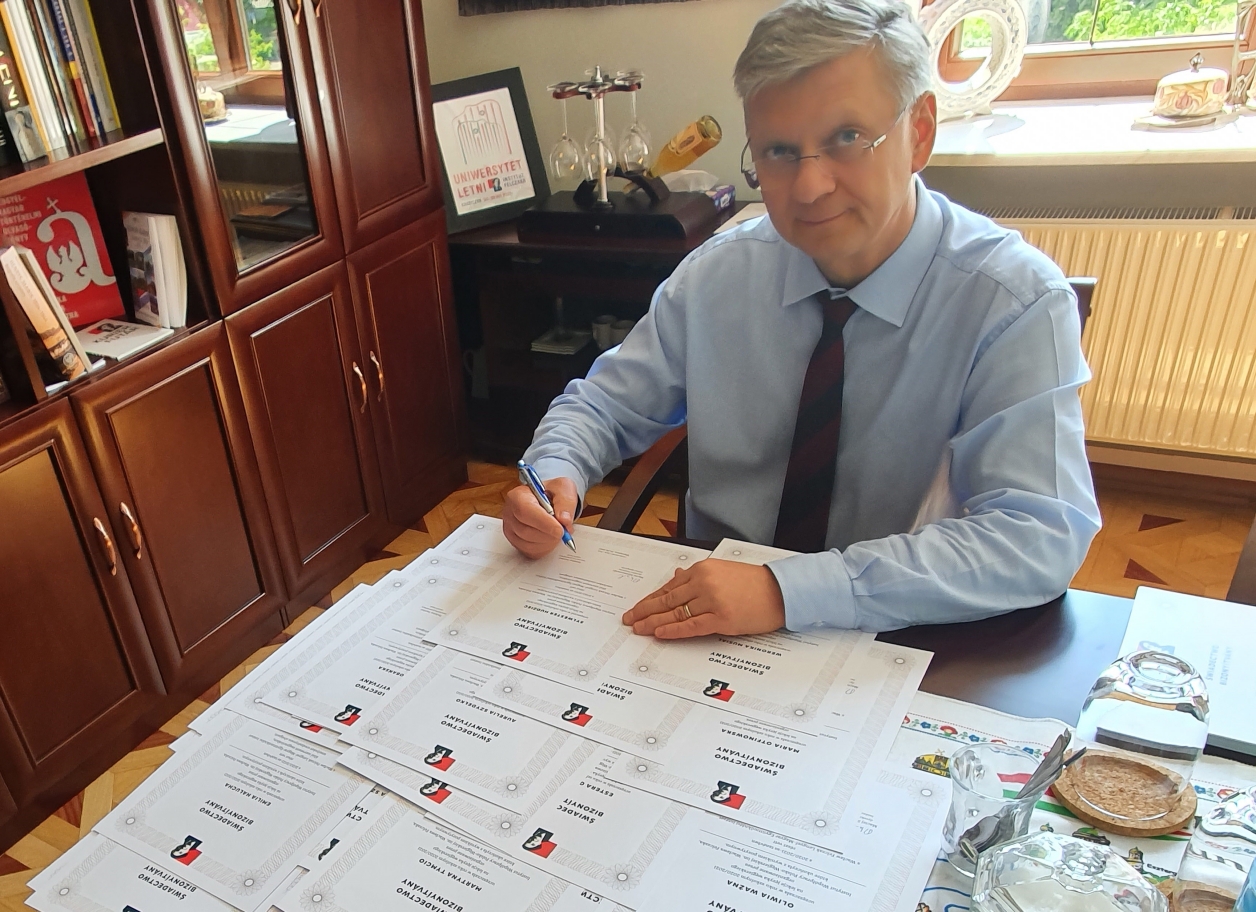
There are forces that are actively working on hindering good relations between Poland and Hungary.Continue reading

His arrival in Hungary, and the consequent decision to grant protective asylum to the former deputy Justice Minister, has increased the already simmering tensions between Hungary’s conservative and Poland’s liberal government. In an exclusive interview for Hungary Today, Marcin Romanowski explained his own perspective on why he was forced to become a political refugee in our country.
Please tell us about the circumstances of you fleeing to Hungary.
I would not call it an escape. I am not fleeing from justice; I am defending myself—and many Poles—from injustice. I believe the best summary of over a year of lawlessness in Poland is the investigation into the crime of forcibly removing constitutional state organs and the creeping coup d’état, as reported by the President of the Constitutional Court. The alleged perpetrators? The Prime Minister, the Minister of Justice, and numerous high-ranking government officials.
A prosecution service taken over unlawfully and forcibly, court presidents replaced illegally, ignoring rulings of the Constitutional Court and the Supreme Court, the illegal imprisonment of opposition MPs—these persecutions have an effect on me too. I was charged with over a dozen absurd accusations, then later detained in violation of international law, despite having immunity as a member of the Parliamentary Assembly of the Council of Europe. You do not have to take my word for it — Theodoros Roussopoulos, President of PACE from the European People’s Party (EPP), and four Polish court rulings confirmed so. The above lawlessness was so blatant that even people openly supportive of the liberal government had to acknowledge it.
Yet an opposition politician persecuted by Tusk’s state apparatus cannot expect access to an impartial justice system. That is why I decided to seek legal protection in Hungary. In early December last year, I simply got into a car and drove to Budapest, where I was granted political asylum. At the same time, I publicly declared that I would return within hours as soon as the rule-of-law is restored in Poland.
You have left behind Poland because you felt that you would not be getting a fair trial, not because you have declared yourself to be innocent. But so many people could claim this on various criteria, so what are yours for deciding that you are indeed a victim of a politically distorted justice system?
A year ago, the government unlawfully and forcibly took over the independent prosecution service. The Constitutional Court and the Supreme Court ruled these actions illegal, but the law of force prevails.
Cases against Tusk’s party politicians are being dismissed, while new ones are opened against opposition figures, including me, to orchestrate a political witch hunt.
I should point out that none of these allegations involve corruption or the embezzlement of funds for personal gain. Of the nineteen charges against me, eight relate to allegedly signing agreements transferring funds to NGOs for a month without authorization—because the minister delegated powers to me by amending a regulation rather than issuing a new one. An absurdity any law student would recognize, fabricated solely to justify the unlawful termination of contracts with these NGOs—most of which, “coincidentally”, have a conservative or Christian profile. The real crime was committed by the current minister, not me. These charges against me only serve to shield the current minister from accountability as he unlawfully dismantles the conservative civil sector. The remaining charges concern alleged influence over competition committees—except that according to law, committees do not make decisions. I do. And to top it off, they claim that all this happened within an “organized criminal group”—a catchy phrase for the media and pretrial detention. Arrests are decided by politicians in judicial robes, as seen in their public activism, including on the X social media portal.
During the proceedings, I was unlawfully deprived of liberty. Prosecutors who should be excluded from my case are handling it. The prosecution is ongoing despite the failure to present valid charges, which should have led to its dismissal. There are numerous glaring irregularities, and I could list many more. I am ready to face a fair court to clear myself of these absurd charges. But judicial purges now allow the government to manipulate court panels and handpick judges for opposition cases.

Photo: Hungary Today
Apart from the fact that Hungary has a long history of receiving Polish refugees, why did you choose Hungary in order to claim asylum? You must be aware of the international political implications of the Hungarian decision to grant you asylum.
As a lawyer, I can only say the decision is fully in line with both national and European law. As a politician,
I see it as a strong signal from Hungary to Brussels, namely, that there is a systemic rule-of-law problem in Poland.
Naturally, EU institutions refuse to acknowledge it, as they deliberately created it themselves, imposing the current liberal government on Poland through blackmail, with the help of the Joe Biden administration. This only highlights the EU’s own systemic rule-of-law crisis within its institutions.
The real reason behind these political persecutions in Poland is the former conservative government’s sovereigntist and anti-woke policies. The European liberal establishment is now working to dismantle political circles in Poland that threaten its liberal, globalist, and woke agenda.
Hungary is now seen as the last bastion of sovereigntism in Europe—Poland’s fell in the autumn of 2023. We must work together, in our shared interest, to take it back.
The regime change in the USA has put the Tusk government in an awkward situation. In the past, with every anti-Polish and anti-Hungarian move they were guaranteed to get a friendly tap on the shoulder from Washington. Now they are scrambling to create a new strategy towards the US. Will this soften their progressive globalist radicalism at all, or will they just rely on their support from Brussels?
The experience of conservatives in Europe is that the anti-woke policies of Donald Trump are already making a change. Of course, it is our task to do our job in our own countries, but strong allies are always welcome. I am pretty sure that the administration of Donald Trump will be a better ally for us conservatives than the Biden was.
The Law and Justice Party (PiS) government, by the admittance of some of its representatives, has made mistakes in terms of not being consistently conservative. Cozying up to the Biden White House or turning their backs on their allies in Hungary. Some say this is what lost them the election, not Tusk’s popularity. Would you agree?
Inconsistency is always risky, but I do not think the PiS government’s good relations with the Biden administration played a major role—it was a matter of state policy, not ideology. Our biggest mistake was our approach to EU policies on climate and the rule-of-law. My faction of the PiS government always believed we should have taken a tougher, more critical stance. Judicial reform should have been completed despite Brussels’ opposition. We lost the momentum that we had as a conservative government in 2015 to 2016—that was the real problem.
Another serious and entirely unnecessary mistake was an initial strong distancing from Hungary after the outbreak of the war in Ukraine.
The policies of Donald Trump clearly showed us that we should not be afraid to stand by our values because of pressure from the establishment. Conservative policies should not be conducted against the leading currents at any expense, but we should not lose our dynamics either. We should always keep in mind what the real problems are. These are currently the woke ideology, radical climate policies, migration and anti-sovereigntist approaches. These are very dangerous ideas. We must understand the threats these ideologies pose and act decisively in the future. We cannot be held back by looking over our shoulders to check what the establishment thinks.
Thank you, @JanosBoka_HU for the meeting and conversation! The friendship between the Polish and Hungarian nations will endure, despite attempts to undermine it by the irresponsible decisions of the Polish government, imposed on us through @EU_Commission blackmail. https://t.co/Y0ZoWRixFq
— Marcin Romanowski (@RomanowskiPL) January 20, 2025
The Ukraine war has turned out to be the Achilles heel of Polish-Hungarian relations, or more precisely, our stance towards Russia. The Hungarian government basically sees this as a proxy war between Russian nationalists and US liberals, and wants to stay out of it. Is Poland ever going to get over their mistrust of Russia to the point where the friendship with Hungary will prevail as the dominant objective?
Poland’s fundamental geopolitical challenge is its position between two major powers: Russia and Germany. We are committed to stopping Russian aggression against Ukraine to ensure our own security. But the Polish-Hungarian alliance is crucial for all of Central Europe. Regional cooperation is not just an ideological stance—it is a practical response to geopolitical threats. That is why, when the Polish government distanced itself from Hungary in February 2022, my political camp took a different view. We sent clear signals in terms that Polish-Hungarian cooperation must not suffer.
This partnership should extend to infrastructure projects like Via Carpatia. As a lawyer, however, I see a key area of cooperation: human rights. The Strasbourg-based system has lost its legitimacy—it is so flawed that it undermines the very rights it claims to protect. Human rights no longer mean what they once did. Protecting the family now means promoting same-sex couples, which I regard as absurd. Yet criticism on its own is not enough. We must build our own human rights system, grounded in the classical concept of human dignity. This could be the first step toward a new Central European alliance based on sovereignty and common sense. We need to return to the foundations of Western civilization.
The Law and Justice Party have actually lost a couple of points in the polls since the elections, while Tusk has gained as much, despite what Polish conservatives claim to be a series of violations of the rule-of-law. Nothing that the liberal Civic Coalition does seems to dent their popularity. Is conservatism in Poland in its death throws?
The rule-of-law crisis in Poland is just beginning to impact ordinary citizens, but it will worsen. Rising energy and living costs are evident, but the real damage—especially from halted infrastructure projects and the chaos in the judiciary—will emerge in the longer term. Blocking development will stun Poland’s growth, yet many remain unaware of this. Most legacy media, including Soros-linked outlets, drive relentless propaganda to manipulate public opinion.
Everything now hinges on the presidential election in May. Tusk’s government currently simply breaks the law because it cannot legally overturn PiS-era reforms without the President’s cooperation. With his veto power intact and no three-fifths majority to override it, Tusk resorts to unlawful methods but still cannot push changes as far as he wants. If their candidate, Rafał Trzaskowski, wins, they will gain full control and be able to reshape everything. This is the decisive issue here. On the other hand, should the conservative candidate, Karol Nawrocki win, Tusk’s system will collapse. Continuing to govern while violating the law would become unsustainable.
Moreover, the charges brought against Tusk’s ministers pose a real threat—potentially resulting in long, even lifelong prison sentences. They cannot afford to lose power and are already preparing a “Romanian scenario” to annul the election if the results are unfavorable. Tusk has crossed the Rubicon, and his inability to retreat is now the greatest danger.
It would be pointless asking you how long do you think your exile in Hungary will last, but an indication of your plans could be whether you start to learn Hungarian or not. Have you started yet?
I will return as soon as the rule-of-law is restored in Poland. I believe it will happen soon—Poles love freedom and despise dictatorship. That is why I have been intensively learning Hungarian, so I do not return without at least basic knowledge of your language—it would be a truly embarrassing failure. I still cannot say “Poles and Hungarians are cousins” correctly, and recently, I was not understood by the waiter when trying to order a beer—the pronunciation of “s” and “sz” is exactly reversed in our respective languages. But I am learning. I can already say: “szuverenitás” (sovereignty).
Featured Image: Hungary Today